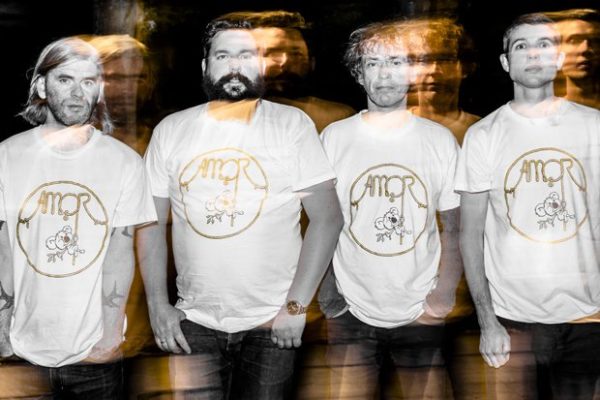Amor & Lemur – live review

January 16, Glasgow CCA
Glasgow has an exceptionally fertile, indeed versatile music scene, so the existence of a band like Amor should come as no great surprise.
Composed of an underground cult musician’s underground cult musician, Richard Youngs, a Turner Prize-nominated experimental filmmaker, Luke Fowler, Franz Ferdinand’s drummer Paul Thomson, and a classically trained virtuoso Norwegian cellist, Michael Duch, the lineup testifies to the porousness of Glasgow’s disparate scenes, and their international reach. The biggest surprise here is that such an unusual lineup can produce such a fresh, organic take on one of the most abused of genres, disco.
The nature of their lineup means that they don’t play too often, so each gig feels like something of an event, especially in early January where it feels like the first major gig of the year, going by the number of Glaswegian cognoscenti who’ve turned out for the occasion. Duch is also a member of classical quartet Lemur, who provide the support, with a set of improvised minimalist pieces which eventually provide the setting for Amor themselves to take the stage. Except that they’re here joined by another body, in the shape of Victoria Morton, another noted figure on the Glasgow art scene, armed with a recorder. Amorphous sounds resolve into Phantoms of the Sun, the first track off their album Sinking Into a Miracle.
While I love Youngs’ yearning tones on the original song, which gives it a vibe akin to Robert Wyatt, here he sits happily in backing singer mode to Morton, whose voice may be more fragile but still plangent.
Fowler on modular synth provides a hard kick drum that sounds like it’s rattling a crate, then Duch’s exquisite rolling bass line comes in and carries all with it. Their music has most often been compared to that of Arthur Russell’s, and those infinitely supple bass lines merit the comparison, thougb there’s an attention to sonic space here that also shows they’ve been paying attention to the master.
So often in music, less is more, and adding extra musicians to the mix often just results in more becoming less, or looking and sounding like something that should be at the Edinburgh Fringe. This wild combination of musicians works because they’re judiciously used, no one hogging the limelight, indulging in attention stealing solos or having to playing something unnecessary simply because they’re stood on a stage. It’s a remarkably – refreshingly – democratic approach, positively attesting to the communal experience and possibilities of disco.
Indeed, even in the process of watching them, the whole band is decentered, from Fowler front stage to Thomson centre stage – always a magnetic presence, admittedly, to Lemur at the right.
Dance music, of course, often works best when at its most minimal, most brutalist, A stripped down, skeletal version of Truth of Life, punctuated by Youngs’ discordant attack on the piano and Thomson getting into his polyrhythms finally sets the front row off – myself included – dancing.
Which we keep up for a finale of Paradise, a version of one of AMOR’s 12”s with yet another body onstage to chant its chorus of “Calling from paradise/Can you get through?” Tonight, Amor did get through, or at least in the vicinity of paradise, and while logistically this extended lineup is unlikely to happen again too soon, I’d love to see it again.
Words by Brian Beadie




